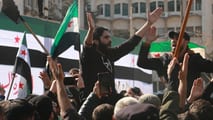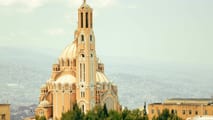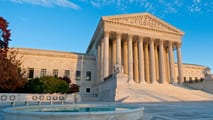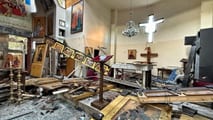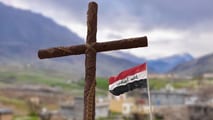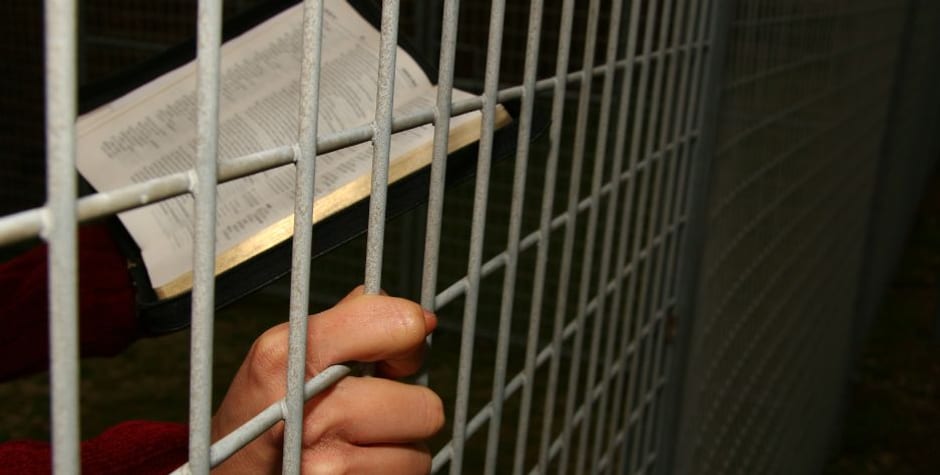

At the UN, the ECLJ Presented New Written Reports on the Persecution of Christians
ECLJ New Reports Christian Persecution
The ECLJ presented several reports to the United Nations on the 44th session of the Universal Periodic Review. They identify infringements upon religious liberty and acts of persecution of Christians in 11 of the 14 countries being reported on.
These countries are all parties to the International Covenant on Civil and Political Rights which states in Article 18 that “everyone shall have the right to freedom of thought, conscience and religion” and “no one shall be subject to coercion which would impair his freedom to have or to adopt a religion or belief of his choice”.[1] Article 27 also adds protection of the rights of minorities.
In most cases identified by the ECLJ, countries are directly responsible for the infringement upon religious liberty, due to restrictive laws and practices. However, there are other sources of persecution, notably from independent armed groups opposed to the concerned States.
Restrictive laws and practices
First, there is an existing social pressure from the population that the State does not fight, or even endorses. For instance, among the numerous attacks suffered by Christian communities of Bangladesh by Muslims and Buddhists, the testimony of a convert is eloquent: while his family and neighbors were beating him, he took refuge to police officers who designated him as responsible because of his conversion before they left him to his fate.[2] In Djibouti too, converts from Islam are rejected by their families.[3]
This adds up to a legal control that voluntarily complicates the establishment of Christian communities. By demanding their registration and the approval of the authorities for their activities, the construction of a church, and even the edition or the importation of Bibles and other religious materials, these States do not persecute Christians on paper, but the enforcement of these laws is systematically done in their disfavor and limits the practice of their faith.
Thus, Azerbaijan punishes religious leaders that fail to register to the authorities[4] with an important fine,[5] but at the same time makes this process laborious. It happened that communities had to wait for more than 10 years to be registered only for limited practice.[6] They are also forbidden to organize meetings specially destined to children and the youth.[7] The approval of a State Committee is also required for any important gathering outside the approved places of worship.[8] Furthermore, the nomination of non-Muslim religious leaders is to be accepted by the State.[9] A community that would not have a registered “religious center” in the country would be refused any nomination and denied the right to grant titles or responsibilities to its clergy or to organize pilgrimages outside of the country. Finally, production or the importation of any religious book, media, or object is also controlled.[10]
In Turkmenistan, a community must count at least 50 people to apply for registration by giving names, dates of birth, and addresses.[11] Here again, the State acted arbitrarily by refusing some application, especially those from Protestant communities.[12] Moreover, Ministry of Justice officials are entitled to monitor any event in a registered community and to interrogate the members of the assembly and the leaders about any aspect of their activity.[13] Police do not hesitate to intervene and inquire about unregistered activity, especially by interrupting celebrations.[14] Finally, the government decreed that a translation of the Bible in Turkmen is illegal.[15]
In Uzbekistan, the State imposes restrictions under the pretext of fighting against religious extremism.[16] Thus, it controls the production, importation, and distribution of any religious book or object, forbids the unauthorized gathering of communities, and limits the participation of minors because it would be forcing them to practice a faith.[17] Christians are especially targeted although the government is also hostile to non-Sunni Muslims.[18] A 2022 order of the Ministry of the Interior requires the installation of cameras in the gathering places of non-Muslim communities.[19] It happens that the police intervene in the middle of a service to arrest members of the community who will spend a part of the night being interrogated if they refuse to sign a declaration claiming they were meeting illegally.[20] [21]
In Cuba, despite the majority of the population (59%) claiming to be Christian,[22] the communist government is historically opposed to religion and works to diminish the influence of Christianism. Although the Cuban constitution recognizes religious freedom,[23] the activity of Christian communities is strictly controlled. Indeed, the Office of Religious Affairs of the Central Committee of the Communist Party is responsible for approving the construction or reparation of churches (even for minor works), public celebrations or foreign visitors linked to a religious community.[24] Membership or participation to the activities of an unregistered religious community is punishable by one to three months of prison.[25] However, this Office denies most of the applications for new communities, which touches especially protestant churches.[26] Already registered Protestant churches are under the supervision of the Cuban Council of Churches, an emanation of the communist party which seeks to orient the doctrines according to its needs.[27] Thus several communities broke away, losing at the same time any legal protection. Arrests, expulsions, and even destruction of religious buildings and objects are numerous. The State does not hesitate to act as soon as a slightly critical discourse is spotted.[28]
Russia is a special case. Indeed, it does not target Christians generally but rather non-orthodox churches. The State requires that organizations that conduct missionary activities do so by clearly mentioning their official denomination, or it will be considered that they violate the freedom of conscience of the citizens by dissimulating their nature.[29] It also exists regulations against “extremist activities”.[30] On this basis and thanks to an extensive interpretation, several Protestant communities have been targeted and their leaders sent to prison or “penal colony” for “extremist activities”, consisting for instance in reading the Bible in groups.[31] Russia considers these communities too linked to the United States and therefore as an ideological threat. An evangelical pastor and his son have been killed by Russian soldiers in Ukraine, in November 2022, accusing them of having “links with America and other occidental countries”.[32]
Interdiction of proselytism
On top of the restrictions imposed on Christians, some countries go as far as directly and officially forbid proselytism. Djibouti establishes Islam as the State religion.[33] Thus, despite civil courts existing for non-Muslims, the laws of the country are largely influenced by Islamic law.[34] Due to this, only Muslims are entitled to openly promote their faith. The Catholic church has for instance to limit itself to social action as would do any secular NGO.[35] In Uzbekistan, missionary work and proselytism are banned,[36] which constitutes a basis for more control, adding to what has been evoked previously.
Dispositions against blasphemy
Bangladesh has Islam as its state religion but guarantees in its constitution the rights of the other religions, especially Hindu, Buddhist and Christian.[37] A law exists in the Criminal Code against blasphemy and profanation,[38] theoretically in favor of no religion, as well as a digital security act that punishes the publication or dissemination of information that hurt values of religious sentiment.[39] However, these are rarely used to protect Christians from the numerous attacks they face from Muslims,[40] but also from Hindus and Buddhists.[41] The ECLJ is also concerned by the vague terms of the digital security act which could be used to infringe on the free practice of the faith.
External factors
In some countries, the difficulty of the State to face insurrection and armed groups puts in dangers Christians who are a privileged target. In Cameroun, a country with a Christian majority,[42] violence from the terrorist group Boko Haram terrorizes the north of the country and is responsible for the death of numerous Christians and the displacement of many more.[43] Some Christian villages have even been completely abandoned.[44] Separatist armed groups are also responsible for exactions, notably of abduction of clergy.[45] Despite the deployment of troops,[46] the government has to face the threat with means often limited. Burkina Faso faces similar issues, Christians being subject to the attacks of groups linked to the Islamic State or Al-Qaeda, especially after COVID-19 and two successive coups in 2022 which have weakened the control of the government.[47] Last, in Colombia, it is cartels and guerillas that target Christians. Indeed, they are viewed as a threat by these groups, as Christian faith and teachings lead the population away from crime and drug.[48] Despite a majorly catholic population, attacks are not rare, and it is estimated that 21 Christians have been killed for their faith in 2022, on top of 37 attacks against churches or Christian buildings.[49] Finally, native population are sometimes hostile to the conversion of their members, the converts thus face threat as well as their families.[50]
____________
[1] International Covenant on Civil and Political Rights | OHCHR, Article 18
[2] Bangladesh, Open Doors UK, https://www.opendoorsuk.org/persecution/world-watch-list/bangladesh/ (last visited April. 6, 2023).
[3] Djibouti: How a Young Christian Convert Chose a Refugee Camp Over a Life of Luxury, Christianity Today (July 24, 2021, 1:43 PM), https://www.christiantoday.com/article/djibouti.how.a.young.christian.convert.chose.a.refugee.camp.over.a.life.of.luxury/137148.htm
[4] Law of the Republic of Azerbaijan “On Freedom of Religious Belief” art. 1é, https://files.preslib.az/projects/remz/pdf_en/atr_din.pdf
[5] Young Boy’s Gift of Christian Books to Classmates Leads to Massive Fines for Parents in Azerbaijan, Barnabas Aid (Jun. 24, 2019), https://www.barnabasfund.org/us/news/young-boy-s-gift-of-christian-books-to-classmates-leads-to-massive-fines/
[6] Felix Corley, Azerbaijan: Religion Law Amendments “More Controlling Mechanisms,” Forum 18 (Jun. 17, 2021), https://www.forum18.org/archive.php?article_id=2666
[7] See note 6.
[8] See note 6.
[9] See note 6.
[10] See note 6.
[11] Felix Corley & John Kinahan, Turkmenistan: Religious Freedom Survey, January 2017, Forum 18 (Jan. 6, 2017), https://www.forum18.org/archive.php?article_id=2244
[12] Felix Corley, Turkmenistan: Raids, Searches, Fines, Threats, Beatings, Headscarf Bans, Forum 18 (Jan. 16, 2020), https://www.forum18.org/archive.php?article_id=2534
[13] See note 11
[14] ACN Int’l, Religious Freedom in the World Report 2021: Turkmenistan 1 (2021), https://acninternational.org/religiousfreedomreport/wp-content/uploads/2021/04/Turkmenistan-.pdf .
[15] Voice of the Martyrs, Turkmenistan, Persecution, https://www.persecution.com/globalprayerguide/turkmenistan/?_source_code=WHPB20C (last visited April. 6, 2023).
[16] Uzbekistan, Open Door USA.
[17] On Freedom of Conscience and Religious Organizations, https://xs.uz/ru/post/o-svobode-sovesti-i-religioznykh-organizatsiyakh (July 6, 2021, 8:36 AM).
[18] Scholarly Analysis: Christian Response to Persecution in Uzbekistan, Under Caesar’s Sword University of Notre Dame, https://ucs.nd.edu/learn/uzbekistan/ (last visited April 6, 2023).
[19] Uzbekistan: Surveillance Extended to Churches, Open Doors Youth (May 16, 2022), https://opendoorsyouth.org/news/uzbekistan-surveillance-extended-to-churches/
[20] Mushfig Bayram, Uzbekistan: Raids, Large Fines, Torturers and Thieves Unpunished, Forum 18 (Nov. 23, 2018), https://www.forum18.org/archive.php?article_id=2431
[21] Mushfig Bayram, Uzbekistan: Military Raids Baptists, Church Ordered Closed, Forum 18 (Nov. 29, 2018), https://www.forum18.org/archive.php?article_id=2433
[22] Cuba, The World Factbook, https://www.cia.gov/the-world-factbook/countries/cuba/
[23] Constitution of Cuba 2019, art. 15, https://www.constituteproject.org/constitution/Cuba_2019.pdf?lang=en
[24] ACN Int’l, Religious Freedom in the World Report: Cuba 2 (2021), https://acninternational.org/religiousfreedomreport//wp-content/uploads/2021/04/Cuba.pdf
[25] See note 24.
[26] Cuba, Open Doors, https://www.opendoors.org/en-US/persecution/countries/cuba/
[27] Cuban Pentecostals Leaves State-Run Council of Churches, Evangelical Focus (Aug. 16, 2022), https://evangelicalfocus.com/world/18234/pentecostal-church-leaves-the-state-run-council-of-churches-of-cuba
[28] Cuban Regime Expels Priest David Pantaleon, Diario Las Américas (Sep. 13, 2022), https://www.diariolasamericas.com/america-latina/regimen-cuba-expulsa-sacerdote-david-pantaleon-n4256662
[29] Kodeks Rossiĭskoĭ Federatsii RF ob Administrativnykh Pravonarusheniiakh [KOAP RF] [Code of Administrative Violations] art. 5.26 (Russ.), https://cis-legislation.com/document.fwx?rgn=1404 (unofficial trans.)
[30] Ugolovnyĭ Kodeks Rossiĭskoĭ Federatsii [UK RF] [Criminal Code] art. 282.2 (Russ.), https://www.imolin.org/doc/amlid/Russian_Federation_Criminal_Code.pdf
[31] RUSSIA: Religious Persecution and Issues/Bimonthly Digest, Nov. 01-15, Hum. Rts. Without Frontiers (Nov. 17, 2022), https://hrwf.eu/russia-religious-freedom-and-issues-bimonthly-digest-01-15-11-2022/
[32] Tola Mbakwe, Russian Forces Torture and Kill Pastor and Son in Ukraine, as Warnings of Christian Persecution Persist, Premier Christian News (Nov. 30, 2022), https://premierchristian.news/en/news/article/russian-forces-torture-and-kill-pastor-and-son-in-ukraine-as-warnings-of-christian-persecution-persist
[33] Constitution of the Republic of Djibouti 1992, art. 1, https://www.constituteproject.org/constitution/Djibouti_2010.pdf?lang=en
[34] Open Doors, Djibouti: Full Country Dossier 8 (Feb. 2022), https://www.opendoors.org/research-reports/country-dossiers/Djibouti-Full-Country-Dossier-February-2022.pdf
[35] AFRICA/DJIBOUTI – The Mission of Caritas: to be Close to the Poor, Agenzia Fides (Mar. 18, 2019), http://www.fides.org/en/news/65740-AFRICA_DJIBOUTI_The_mission_of_Caritas_to_be_close_to_the_poor
[36] See note 17
[37] Constitution of the People’s Republic of Bangladesh 1972 (reinstated 1986, rev. 2014), art. 2A
[38] The Penal Code, 1860 art. 295 (Bangl.).
[39] Digital Security Act, 2018 art. 28 (Bangl.).
[40] Int’l Christian Concern, Muslim Groups Attempt to Stifle Christian Growth in Bangladesh, Persecution (Mar. 3, 2022), https://www.persecution.org/2022/03/04/muslim-groups-attempt-stifle-christian-growth-bangladesh/.
[41] Bangladesh: Full Country Dossier, Open Doors 6 (Dec. 2021), https://www.opendoors.org/persecution/reports/Full-Country-Dossier-Bangladesh-2022.pdf.
[42] Cameroon, The World Factbook, https://www.cia.gov/the-world-factbook/countries/cameroon/ (Mar. 7, 2023).
[43] Int’l Christian Concern, Boko Haram Terrorists Kill 4 Civilians in Cameroon, Persecution (Nov. 11, 2021).
[44] The Voice of the Martyrs, Cameroon, Persecution.
[45] Moki Edwin Kindzeka, Cameroon Says Separatists are Keeping 8 Abducted Clergy and Christians on Nigerian Border, VOA News (Nov. 19, 2022), https://www.voanews.com/a/cameroon-says-separatists-are-keeping-8-abducted-clergy-and-christians-on-nigerian-border/6753291.html.
[46] Moki Edwin Kindzeka, Cameroon Military Asks Civilians Displaced by Boko Haram to Return, VOA News (Oct. 6, 2022, 9:25 AM), https://www.voanews.com/a/cameroon-military-asks-civilians-displaced-by-boko-haram-to-return-/6778384.html
[47] Burkina Faso, Open Doors US, https://www.opendoorsus.org/en-US/persecution/countries/burkina-faso/ (last visited Feb. 13, 2023).
[48] Christian Today, The Heavy Price Paid by Christians Who Stand up to Colombia’s Powerful Drug Cartels, https://www.christiantoday.com/article/the.heavy.price.paid.by.christians.who.stand.up.to.colombias.powerful.drug.cartels/136019.htm (Dec. 4, 2020, 3:37 PM).
[49] The 50 Countries Where It’s Hardest to Follow Jesus in 2023, Christianity Today (Jan. 17, 2023, 06:01 PM), https://www.christianitytoday.com/news/2023/january/christian-persecution-2023-countries-open-doors-watch-list.html
[50] Anugrah Kumar, Christian Teen Fled Persecution in Colombia, Fears for Family’s Safety Amid Threats of Violence, Christian Post, https://www.christianpost.com/news/christian-teen-persecuted-for-faith-in-colombia-fears-for-family.html (Dec. 15, 2022)., Christian Post (Dec. 15, 2022).




